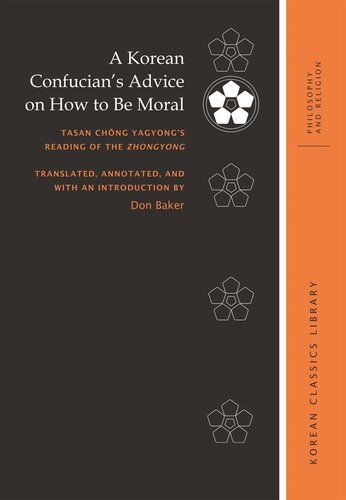

Most ebook files are in PDF format, so you can easily read them using various software such as Foxit Reader or directly on the Google Chrome browser.
Some ebook files are released by publishers in other formats such as .awz, .mobi, .epub, .fb2, etc. You may need to install specific software to read these formats on mobile/PC, such as Calibre.
Please read the tutorial at this link: https://ebookbell.com/faq
We offer FREE conversion to the popular formats you request; however, this may take some time. Therefore, right after payment, please email us, and we will try to provide the service as quickly as possible.
For some exceptional file formats or broken links (if any), please refrain from opening any disputes. Instead, email us first, and we will try to assist within a maximum of 6 hours.
EbookBell Team

5.0
90 reviewsTasan Chŏng Yagyong (1762–1836) is one of the most creative thinkers Korea has ever produced, one of the country’s first Christians, and a leading scholar in Confucian philosophy. Born in a staunchly Neo-Confucian society, in his early twenties he encountered writings by Catholic missionaries in China and was fascinated. However, when he later learned that the Catholic Church condemned the Confucian practice of placing a spirit tablet on a family altar to honor past generations, he left the small Catholic community he had helped found and ostensibly returned to the Neo-Confucian fold. Nevertheless, the Christian ideas he studied in his youth influenced his thinking for the rest of his life, stimulating him to look at Neo-Confucianism with a critical eye and suggest new solutions to problems Confucian scholars had been addressing for centuries. A Korean Confucian’s Advice on How to Be Moral is an annotated translation of Tasan’s commentaries on the Confucian classic Zhongyong (usually translated as The Doctrine of the Mean) in which he applies both Confucianism and Christianity to the question of how to best develop a moral character.
Written as a dialogue with King Chŏngjo, (r. 1776–1800) these texts reveal how Tasan interpreted his Confucian tradition, particularly its understanding of how human beings could cultivate morality, while the king’s questions illustrate the mainstream Neo-Confucianism Tasan was reacting against. Tasan challenged the non-theistic standard, insisting that living a moral life is not easy and that we need to be motivated to exert the effort necessary to overcome our selfish tendencies. He had abandoned his faith by the time he wrote these commentaries but, influenced by Catholic works and determined to find a more effective way to live a moral life than non-theistic Neo-Confucianism provided, Tasan constructed a Confucian philosophy of moral improvement centered on belief in God. This translation, helpfully annotated for context and analysis, is an exploration of early Korean engagement with the West and a powerful guide to all those interested in Confucianism, Christianity, and morality.